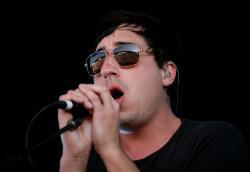Grizzly Bear are one of the most successful bands in indie rock. Their breakout 2009 album Veckatimest launched them to No. 8 on the Billboard charts, selling 33,000 copies. Their new album Shields debuted at No. 7, selling 39,000. Last week they played a homecoming show at the 6,000-capacity Radio City Music Hall. Even if you don’t own any of their music, you’ve probably heard it in a car commercial.
Despite all this, Grizzly Bear are not living like rock stars. In fact, after riding a steady trajectory of success for more than half a decade, they’re living more or less the same way they were when they started. As Nitsuh Abebe notes in his excellent profile and cover story for the newest issue of New York magazine, many of them don’t have insurance. Band founder Ed Droste still lives with his husband in the same 450-square-foot Williamsburg apartment. Though they’re living comfortably for now, they haven’t earned any stability. Abebe identifies their joint musical venture as essentially “a risky small business,” and guitarist Daniel Rossen point out that when “your livelihood is in songwriting, you never know when that’s just gonna stop.”
To be clear, Grizzly Bear aren’t going out of their way to complain or ask for pity. As with any indie band, they know that they’re not supposed to be in it for the money. Instead they’re responding, with some reluctance, to Abebe’s probing into what it’s like to live near the top of indie’s small kingdom. And even today, they insist that they’re pretty happy with their career choice: They were always playing and writing for themselves, they say, and they still enjoy doing it.
But while Grizzly Bear fans surely won’t mind that their favorite musicians aren’t showing off their mansions on MTV Cribs—in fact, they might turn on them if they did—there’s perhaps still a sense that the band should be rich. That that’s what you deserve when you work hard to reach the top of your field. Or at least that you should have earned the stability of a middle class lifestyle. Droste says that revealing their finances would be “inappropriate.”* “Obviously we’re surviving,” he says. “Some of us have health insurance, some of us don’t, we basically all live in the same places, no one’s renting private jets. Come to your own conclusions.”
If you’re a fan of the band, it’s easy to feel disappointed by this. Everyone knows that the music industry is struggling and that it’s hard to be a musician, but hasn’t indie rock mythology trained many of its fans to expect more? If you believe in indie rock, you might do so in part because you expect that your band, while less commercially successful than major pop artists, is more relevant. That the underground is where the real innovation is. And that some day that underground is going to give birth to its Nevermind and become the next big thing.
Indie rock fans have been charting this rise for a long time. Abebe himself wrote an article on “The Decade in Indie” in 2010 that began by declaring (only half ironically) that “Indie rock is the choice of a new generation!” and proceeding to detail the number of indie bands that had begun approaching the top of the charts. Bands like The Shins and Death Cab for Cutie and Vampire Weekend, the latter two of which had just charted at #1. The following year, Arcade Fire won the Grammy for Album of the Year in a shocking upset, and prompted some sites to ask themselves, “What does that mean?” Grizzly Bear was right among these breakouts. When Arcade Fire soundtracked a Super Bowl commercial in 2010, Grizzly Bear did, too. Even Jay-Z saw something rising. After he and Beyoncé showed up to a Grizzly Bear show in Brooklyn in 2009, he compared the “indie-rock movement” to where hip-hop was when he was starting out.
But this year many of those same bands that had breakout years in 2009—including Animal Collective, Dirty Projectors, and Grizzly Bear—are back with albums charting in the same range, and little higher. (Dirty Projectors made the biggest gain, reaching No. 22.) Maybe indie rockers and freak-folkers will still launch the next Nirvana or Jay-Z—the folk rock band Mumford & Sons, though despised in certain corners of indie rock, is expected to claim the biggest debut of 2012 this week—or maybe, as seems likely to me, it will always be a relatively small subgenre. Maybe no band should expect to rise above the ceiling reached by Grizzly Bear, and fans should remember that these artists—even if you do hear them in a Super Bowl commercial—still need your support.
Read Abebe’s cover story at New York and check out their breakdown of what artists can expect to make.
*Correction, Oct. 2, 2012: This article originally misquoted Ed Droste as finding Grizzly Bear’s financial situation “inappropriate.” Divulging their income is what Droste said might be “inappropriate.”
